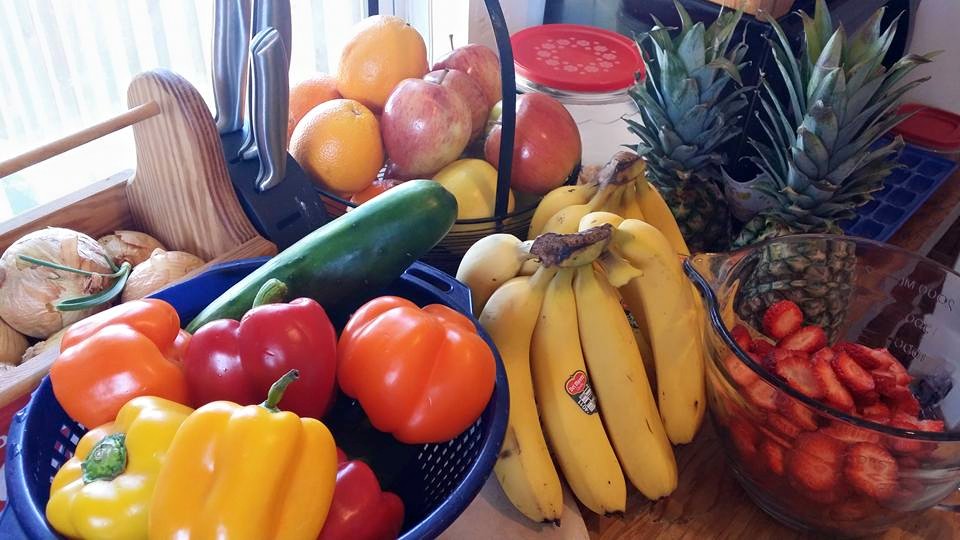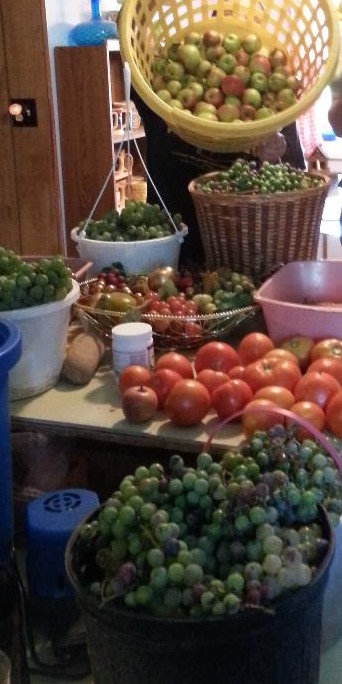As an Amazon Associate I earn from qualifying purchases.

Anti-inflammatory
and
Inflammatory foods

What is inflammation?
Anti-inflammatory and inflammatory foods are very important in determining the condition of our health.
According to many studies, long term inflammation plays a large part in that determination, and inflammation is a common root of chronic disease.
Here's a list of some of the diseases and how inflammation plays a role in them.
- Heart disease: Chronic inflammation can lead to the development and progression of heart disease, including conditions such as coronary artery disease, heart attack, and stroke.
- Arthritis: Inflammation plays a critical role in the development of various types of arthritis, including rheumatoid arthritis and osteoarthritis.
- Diabetes: Chronic inflammation can impair insulin sensitivity and contribute to the development of type 2 diabetes.
- Asthma: Inflammation of the airways is a key characteristic of asthma, leading to symptoms such as wheezing, shortness of breath, and coughing.
- Inflammatory bowel disease (IBD): Conditions such as Crohn's disease and ulcerative colitis are chronic inflammatory disorders affecting the gastrointestinal tract.
- Alzheimer's disease: Chronic inflammation in the brain has been implicated in the development and progression of Alzheimer's disease.
These are just a few examples, but inflammation can be involved in numerous other diseases as well, including certain types of cancer, autoimmune disorders, and chronic lung diseases.
It's known that there are four classic symptoms of inflammation being present, which are:
- redness,
- heat,
- swelling and
- pain.
Normal and abnormal inflammation
There is normal and abnormal inflammation response.
Normal inflammation is a response that brings visible evidence of the body's healing system going to work.
It shows the arrival of nourishment and immune activity in an area that needs them. Remember the four symptoms that appear?
- redness,
- heat,
- swelling and
- pain.
However, it becomes abnormal when the inflammation doesn't end as the problem that triggered it resolves.
Inflammatory foods can be a definite cause and/or aggravation for increased inflammation.
As the inflammation continues, it spreads to areas of the body that have not experienced injury or attack and then becomes chronic and abnormal.
When the inflammation gets out of control it begins to attack normal tissues and won't quit.
In being abnormal, it then promotes disease rather than healing.
 Display of delicious anti-inflammatory foods.
Display of delicious anti-inflammatory foods.Reducing
Inflammation
With FOOD
The anti-inflammatory diet is quite similar to the Mediterranean diet, which time and again ranks as the healthiest diet, thanks to its various benefits.
Anti-Inflammatory meals highlight massive amounts of antioxidant-rich foods such as dark leafy vegetables, and colorful fruits, in addition to high consumption of healthy fats and seafood such as salmon.
In addition, anti-inflammatory meal plans avoids the intake of refined grains such as white pasta, massive amounts of processed foods, and sugar.
You usually won’t find meat such as pork, but you can expect some beef, plenty of chicken, fish, and vegan proteins such as legumes and nuts.
Make A Plan To Reduce Inflammation
For better health, a good plan is to avoid all inflammatory foods for at least 3-4 weeks to detox and rest your body and greatly reduce inflammation.
There are many complex nutrients, vitamins and minerals in natural real and living foods that help prevent and heal inflammation in our bodies.
It is known and has been known all throughout history that certain foods, plants, herbs, spices, raw diary and unprocessed meat help maintain a healthy body.
Fake Food is a Common Cause of Inflammation
Our bodies were not made to consume chemicals, and other products that are not real (fake), and then be expected to function properly.
All fake food is found to be inflammatory foods.
However, currently too many of our "foods" are processed to the point that literally all the nutrition has been stripped from it.
Or, some are just made from ingredients that are not even a real food product, but are made to look and taste like real food.
Over processed, chemical-ized, fake food is a very common cause of inflammation.
That is the reason they are called inflammatory foods. They cause our bodies to react as if it is protecting us from illness and results in inflammation.
Which in all reality we do have many "lifestyle/chronic diseases" caused by the fake "food" and chemicals added to products we consume and put on.
So it results in our bodies doing what they are supposed to do to keep us from any supposed illness. Which often results in chronic inflammation.
Our bodies recognize that those substances are not natural or useful, and instead are dangerous.
In addition, if the fake food can't be detoxed, it will be stored somewhere in our body, usually in our fat or our many glands. They are part of a wonderfully complex system for filtering and protecting our body from dangerous toxins and poisons .
This is a process to protect your life supporting organs and body.
However the substances often are still affecting us because they sit in our bodies, causing inflammation and a host of other problems.
You are welcome to copy and paste the Anti-inflammatory and Inflammatory food lists below to use for your own reference.
Anti-Inflammatory foods and how they work:
Veggies: Squashes; tomatoes; carrots; olives; leafy greens of all kinds cabbage; asparagus; broccoli; cauliflower; cucumber; onions; bell peppers; eggplant; sweet potatoes; okra...all kinds of veggies, specifically deep colored ones.
Vegetables like spinach, kale, and Swiss chard are packed with nutrients like vitamins A, C, and K, as well as antioxidants and phytochemicals that help combat inflammation.
Fruit: apples; all berries (especially blueberries); kiwis; cherries; red grapes; melons; lemons; oranges; pineapple; (tart cherries; pumpkin- both which help to reduce joint inflammation).
Berries are high in antioxidants such as anthocyanins and vitamin C, which help to neutralize free radicals and reduce oxidative stress and inflammation in the body.
Meats: Salmon; tuna; non scavenger fish; chicken; turkey; sardines; mackerel; deer; beef-small amounts.
Fish like salmon, mackerel, and sardines are rich in omega-3 fatty acids, have been shown to have potent anti-inflammatory properties and can help reduce inflammation in the body.
They can help reduce inflammation and may provide relief for conditions such as arthritis and inflammatory bowel disease.
Extra protein: eggs; chia seeds
Dry Beans: (good carbs) such as navy beans, kidney beans, pinto beans, and black beans, also an excellent source of plant protein, minerals, B-complex vitamins, and vitamin K.
Nuts and Seeds: walnuts; almonds; pecans; sunflower; pumpkin-pepitas
Nuts such as almonds and walnuts are high in healthy fats, fiber, and antioxidants, all of which have anti-inflammatory properties.
Probiotic Rich Foods: Plain Greek Yogurt- (add own natural fruit and sweetener-stevia or honey); Sauerkraut; Kefir natural organic - sweetened with stevia; (raw milk products after 3 weeks of anti inflammatory foods only)
Probiotics are beneficial bacteria that can support gut health and reduce inflammation.
They can be found in fermented foods like yogurt, kefir, sauerkraut, and in supplement form.
Herbs and Seasonings: Garlic; rosemary; tumeric; cinammon; ginger; fenugreek; basil; thyme; moringa; cacao; cayenne; sea, himalayin, or kosher salt;
Curcumin, the active compound in turmeric, has been shown to have strong anti-inflammatory effects. It inhibits the activity of inflammation-promoting molecules in the body.
Ginger possesses multiple biological activities, especially antioxidant and anti-inflammatory capacities.
Oils/Fats: Olive; coconut; avocado; sesame; real/natural butter.
Extra virgin olive oil contains polyphenols, which have been shown to reduce inflammation in the body by inhibiting inflammatory pathways.
Medium Chain Tryglicerides in coconut oil possesses anti-inflammatory
properties that may lower your risk of chronic disease. The ingestion
of medium-chain triglycerides reduces pro-inflammatory immune cell
production and increases anti-inflammatory immune cell production.
Sweeteners:
Stevia; raw honey; monk fruit; organic maple syrup; dates. Use all of these in moderation.
Beverages and Teas: Water (lots of it); Coconut water; coconut and almond milk; green tea; rooibos; dandelion; nettle; mint; ginger; turmeric; holy basil; rose hip; clove bud tea and chamomile teas.
The main polyphenol in green tea is epigallocatechin gallate (EGCG). Scientific studies suggest that EGCG and green tea polyphenols have anti-inflammatory and anticancer properties that may help prevent the development and growth of skin tumors.
Snack: energy balls; dark chocolate 70%; cacao choc., fruit, nuts and seeds
Adding the above listed foods to your diet can provide numerous health benefits and help mitigate chronic inflammation.
Add: Stretches for muscles, walking and exercises to build muscle.
A natural Dr. we saw several years ago gave us this advice: Always have your plate ¾ full of colorful veggies and fruit, as fresh as possible. Make the remainder of the plate a small serving of meat and a small serving of good carb food, during the 3 weeks.
Inflammatory Foods
Completely avoid all inflammatory foods for 3 weeks, and as much as possible thereafter.
Sugars: #1 Processed Sugar (all kinds); #2 Corn syrup liquid or solids; As well as pancake syrup which is usually flavored corn syrup.
All Artificial Sweeteners: aspartame, sucralose, glucose syrup (usually just corn syrup renamed),the list is long so best just to avoid anything that sounds like a chemical name, because it probably is.
Drinks: Pop/Soda; and other high sugar drinks, especially with High Fructose Corn Syrup. Carbonation in drinks can cause inflammation and puffiness as well. It's a gas our bodies are not made to process.
*"Study Introduction: High consumption of carbonated soft drinks (CSD) during adolescence may reduce bone mineral accrual and increase fracture risk. The aim of this study was to examine the relationship between CSD consumption and bone mineral density (BMD) in a representative sample of adolescents.
Health news from Harvard stated: carbonated beverages have long been associated with low bone density and fractures specifically in adolescent girls.
Some other studies have connected increase in bone fractures in children to excess soft drink consumption specifically due to phosphorus/phosphoric acid which can interfere with calcium absorption and contribute to bone loss, potentially increasing the risk of osteoporosis and fractures."
Dairy: Pasteurized and processed milk products; cheese that is not raw & organic
Meats: Excess red meat
Pork; shrimp; oysters; catfish (scavenger animals contain many detrimental toxins, and cause inflammation)
White Starches: White bleached Flour, White rice, breads-specifically white and any with corn syrup in them. It is more common that you may know.
Oils:
vegetable, canola, cottonseed, corn, sunflower oils and hydrogenated
oils including lard. Manufactured, synthetic, over processed and most contain chemicals to help cover the rancidness of the oil.
Processed
foods of all kinds, especially boxed and packaged.
...anything that can sit on a
shelf for months and not decompose should not be put in our bodies. More than likely they have large doses of synthetic preservatives.
Our body cannot process and digest it properly.
References: * Carbonated soft drink consumption and bone mineral density in adolescence: the Northern Ireland Young Hearts project C McGartland 1 , P J Robson, L Murray, G Cran, M J Savage, D Watkins, M Rooney, C Boreham Affiliations Free article PMID: 12968664
I personally believe, that God in his infinite love and wisdom provided everything we need for both our physical and spiritual well being. He gave us his awesome creation for our sustenance and health, then made provision and hope for our eternal destiny . Click on the link if you would like to know more.






